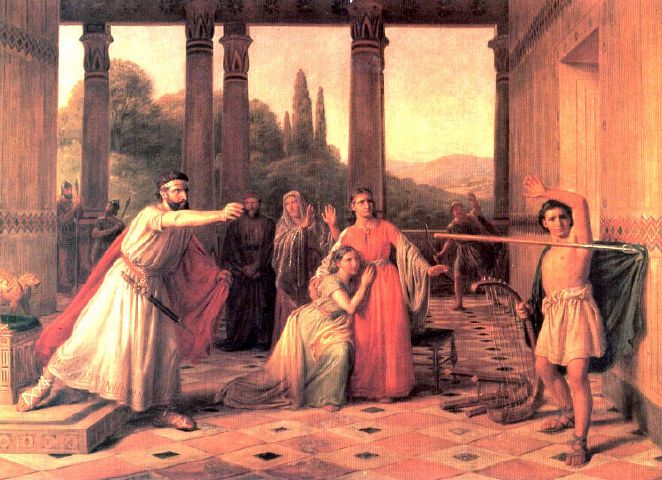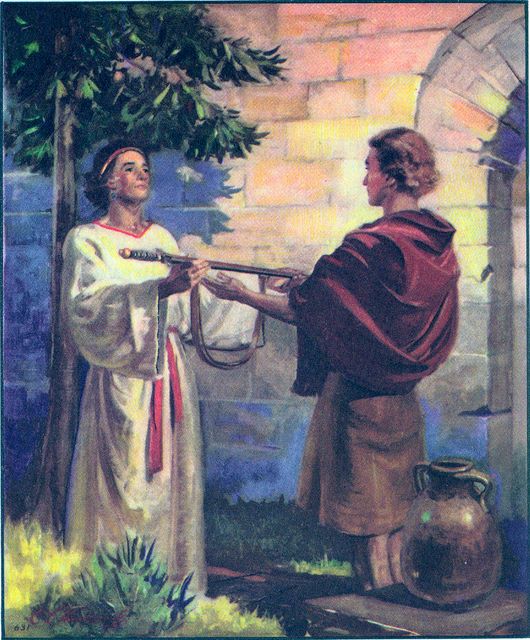THE LITTLE BOY LOOKING FOR THE ARROWS
I Samuel 17:55 to 20:42
AFTER David had slain the giant he was brought before King Saul who took him into his own house, and later in time made him an officer among his soldiers. David was as wise and as brave in the army as he had been when facing the giant, and very soon he was in command of a thousand men. All the men loved him, both in Saul's court and in his camp, for David had the spirit that drew all hearts toward him.
When David was returning from his battle with the Philistines the women of Israel came to meet him out of the cities, with instruments of music, singing and dancing, and they sang:
"Saul has slain his thousands,
and David his ten thousands."
This made Saul very angry, for he was jealous and suspicious in his spirit. He thought constantly of Samuel's words, that God would take the kingdom from him and would give it to one who was more worthy of it. He began to think that perhaps this young man, who had come in a single day to greatness before the people, might try to make himself king.
His former feeling of unhappiness again came over Saul. He raved in his house, talking as a man talks who is crazed. By this time they all knew that David was a musician, and they called him again to play on his harp and to sing before the troubled king. But now, in his madness, Saul would not listen to David's voice. Twice he threw his spear at him; but each time David leaped aside, and the spear went into the wall of the house.
Saul was afraid of David, for he saw that the Lord was with David, as the Lord was no longer with himself. He would have killed David, but did not dare to kill him, because everybody loved David. Saul said to himself, "Though I cannot kill him myself, I will have him killed by the Philistines."
And he sent David out on dangerous errands of war; but David came home in safety, all the greater and the more beloved after each victory. Saul said, "I will give you my daughter Merab for your wife if you will fight the Philistines for me."
David fought the Philistines; but when he came home from the war he found that Merab, who had been promised to him, had been given as wife to another man. Saul had another daughter, named Michal. She loved David, and showed her love for him. Then Saul sent word to David, saying, "You shall have Michal, my daughter, for your wife when you have killed a hundred Philistines."
Then David went out and fought the Philistines, and killed two hundred of them; and they brought the word to Saul. Then Saul gave him his daughter Michal as his wife; but he was all the more afraid of David as he saw him growing in power and drawing nearer to the throne of the kingdom.
But if Saul hated David, Saul's son, Jonathan, loved David with all his heart. This was the brave young warrior who with his armor-bearer went out alone to fight the Philistine army. Jonathan saw David's courage and nobility of soul, and loved him with all his heart. He took off his own royal robe, and his sword, and his bow, and gave them all to David. It grieved Jonathan greatly that his father, Saul, was so jealous of David. He spoke to his father, and said: "Let not the king do harm to David; for David has been faithful to the king, and he has done great things for the kingdom. He took his life in his hand, and killed the Philistine, and won a great victory for the Lord and for the people. Why should you seek to kill an innocent man?"
For the time Saul listened to Jonathan, and said, "As the Lord lives, David shall not be put to death."
And again David sat at the king's table, among the princes; and when Saul was troubled again David played on his harp and sang before him. But once more Saul's jealous anger arose, and he threw his spear at David. David was watchful and quick. He leaped aside, and, as before, the spear fastened into the wall.
Saul sent men to David's house to seize him; but Michal, Saul's daughter, who was David's wife, let David down out of the window, so that he escaped. She placed an image on David's bed and covered it with the bed-clothes. When the men came, she said, "David is ill in the bed, and cannot go."
They brought the word to Saul, and he said, "Bring him to me in the bed, just as he is."
When the image was found in David's bed, David was in a safe place, far away. David went to Samuel at Ramah, and stayed with him among the men who were prophets worshipping God and singing and speaking God's word. Saul heard that David was there, and sent men to take him. But when these men came and saw Samuel and the prophets praising God and praying, the same spirit came on them, and they began to praise and to pray. Saul sent other men, but these also, when they came among the prophets, felt the same power, and joined in the worship.
Finally, Saul said, "If no other man will bring David to me, I will go myself and take him."
And Saul went to Ramah; but when he came near to the company of the worshippers, praising God, and praying, and preaching, the same spirit came on Saul. He, too, began to join in the songs and the prayers, and stayed there all that day and that night, worshipping God very earnestly. When the next day he went again to his home in Gibeah, his feeling was changed for the time, and he was again friendly to David.
But David knew that Saul was at heart his bitter enemy and would kill him if he could as soon as his madness came upon him. He met Jonathan out in the field away from the place. Jonathan said to David:
"Stay away from the king's table for a few days, and I will find out how he feels toward you, and will tell you. Perhaps even now my father may become your friend. But if he is to be your enemy, I know that the Lord is with you, and that Saul will not succeed against you. Promise me that as long as you live you will be kind to me, and not only to me while I live, but to my children after me."
Jonathan believed, as many others believed, that David would yet become the king of Israel, and he was willing to give up to David his right to be king, such was his great love for him. That day a promise was made between Jonathan and David, that they and their children, and those who should come after them, should be friends forever.
Jonathan said to David, "I will find how my father feels toward you, and will bring you word. After three days I will be here with my bow and arrows, and I will send a little boy out near your place of hiding, and I will shoot three arrows. If I say to the boy, 'Run, find the arrows, they are on this side of you,' then you can come safely, for the king will not harm you. But if I call out to the boy, 'The arrows are away beyond you,' that will mean that there is danger, and you must hide from the king."
So David stayed away from Saul's table for two days. At first Saul said nothing of his absence, but at last he said:
"Why has not the son of Jesse come to meals yesterday and to-day?"
And Jonathan said, "David asked leave of me to go to his home at Bethlehem and visit his oldest brother."
Then Saul was very angry. He cried out, "You are a disobedient son! Why have you chosen this enemy of mine as your best friend? Do you not know that as long as he is alive you can never be king? Send after him, and let him be brought to me, for he shall surely die!"
Saul was so fierce in his anger that he threw his spear at his own son Jonathan. Jonathan rose up from the table, so anxious for his friend David that he could eat nothing. The next day, at the hour agreed upon, Jonathan went out into the field with a little boy. He said to the boy, "Run out yonder, and be ready to find the arrows that I shoot."
And as the boy was running Jonathan shot arrows beyond him, and he called out, "The arrows are away beyond you; run quickly and find them."
The boy ran, and found the arrows, and brought them to Jonathan. He gave the bow and arrows to the boy, saying to him, "Take them back to the city. I will stay here a while."
And as soon as the boy was out of sight David came from his hiding-place and ran to Jonathan. They fell into each other's arms and kissed each other again and again, and wept together. For David knew now that he must no longer hope to be safe in Saul's hands. He must leave home, and wife, and friends, and his father's house, and hide wherever he could from the hate of King Saul.
Jonathan said to him, "Go in peace; for we have sworn together saying, 'The Lord shall be between you and me, and between your children and my children forever.' "
Then Jonathan went again to his father's palace, and David went out to find a hiding-place.


